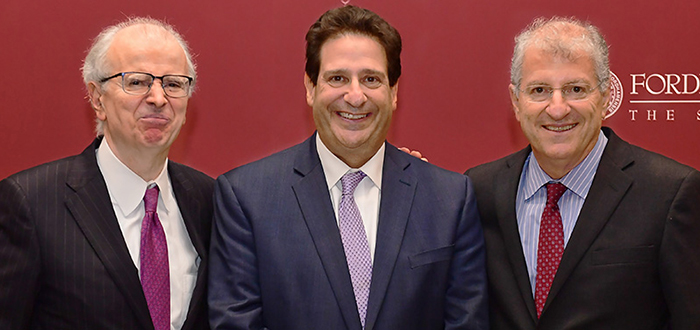A2J Initiative co-directors Matthew Diller, Jonathan Lippman, and David Udell wrote a column for The Hill about the closure of the Justice Department’s Office on Access to Justice.
Recently, the Department of Justice “quietly closed” its Office on Access to Justice. This is a major setback for every American who cares about ensuring equal justice under the law, a core ideal since our country’s founding. And it’s devastating for the millions of low-income and working people who would have benefited from the office’s work.
The Office on Access to Justice, opened in 2010, was a bold and unprecedented effort by the Justice Department, driven by the principle that our federal government has a responsibility to ensure that our legal system is a system of justice in actuality, as well as in name. The office tackled a critical problem: Our justice system, designed to assure the rule of law, can be intimidating and inaccessible, and too often produces unfair results for those who cannot afford an attorney.
In our criminal justice system, too many people are locked up not for committing a crime but because of their poverty — because they cannot afford bail. And their public defenders handle caseloads that far exceed recommended limits, jeopardizing those attorneys’ ability to provide representation that meets constitutionally minimum standards.
In our civil justice system, people’s lives are likewise impacted in ways that rival the harshness of the criminal justice system. Routinely, and often unnecessarily, people lose their homes, families, savings, food, medical care — even their emotional and physical safety and security — because they cannot afford legal representation. According to the Justice Department’s own website, 50 million Americans qualify for federally-funded civil legal aid, yet more than half of those who seek help are turned away because of lack of resources.
The Office on Access to Justice, using its high-profile perch within the federal government, pulled together stakeholders to facilitate local efforts in setting an agenda for reform. The office saw its task as articulating American values and constitutional expectations of fairness and due process. Very quickly, it demonstrated that solid leadership could bring about results that would improve people’s lives.
…
On multiple fronts in its criminal justice initiatives, the Office on Access to Justice helped effectuate change. It consistently led with our country’s highest ideal of equal justice. It supported local approaches that improved indigent defense services, corrected bad bail policies, and tackled the criminalization of homelessness. It also improved conditions for communities of color and the working class by urging limits on the use of court fines and fees as a financing mechanism for local governments.
The office’s work within the civil justice system was no less effective. Its role in publicly identifying civil justice system reform as essential to fairness in our legal system was, alone, game-changing. It spurred recognition that unjust outcomes in eviction and foreclosure disputes, debt collection cases, family violence battles and many other types of civil justice proceedings, not only harm individuals and families, but also undercut society by pushing more and more people into our jails and prisons, compounding the problem of mass incarceration in America.
…
In our roles as co-directors of the A2J Initiative at Fordham Law School, we are disappointed and dismayed by the shuttering of the Office on Access to Justice. We recognize that when individuals cannot rely on the justice system to protect their most basic rights, they lose faith in their public institutions. We are guided by the belief that greater access to justice can help to restore trust in our justice system.
Our work to expand access to justice, like that of our colleagues around the country, will continue. But, through the closing of the Office of Access to Justice, we’ve lost a strong partner within the Justice Department. The effects of that loss will be felt for years to come.
In this moment of taking stock, we must renew our commitment to using research, creativity, advocacy, common sense and our constitutional principles to improve our criminal and civil justice systems — insisting, more than ever, on justice for all.

